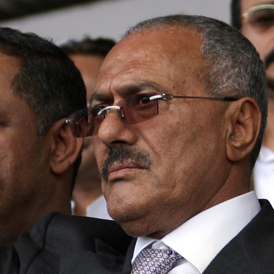President Saleh calls for ceasefire on return to Yemen
Yemen’s President Ali Abdullah Saleh has returned to the country after spending three months in Saudi Arabia following an assassination attempt in June. He has called for an immediate ceasefire.

Saleh, who was seriously wounded in an explosion in a mosque where he was praying with families and officials in June, called for a ceasefire between loyalist troops battling forces backing a mass protest movement.
He left Yemen for treatment in Saudi Arabia shortly after the attack, but has now returned to beleagured nation.
“The solution is not in the mouths of rifles and guns, it is in dialogue and stopping bloodshed,” the defence ministry cited Saleh as saying on Friday.
News channel Al Arabiya has reported that Saleh would chair a ruling party meeting and quoted an unnamed official who claimed that he could announce his resignation, only to hand over the reigns of power to his son, Ahmed.
Saleh’s return comes amid an escalation of violence in Yemen’s capital Sanaa.
Within minutes of the announcement of his arrival, gunfire and explosions were heard echoing through the capital.
This week, loyalist troops clashed with forces backing anti-Saleh protesters, leaving more than 100 people dead – bringing the toll in the eight-month uprising to about 450 dead.
Saleh has clung to his 33-year rule in Yemen despite pressure to sign a power transition deal and the June bomb attack.
Tom Finn, a British journalist based in Sanaa, said that doctors had confirmed the deaths of six protesters – five from bullet wounds – an hour or so after news of Saleh’s return was announced.
He said that two thousands-strong groups, Saleh loyalists and opponents had gathered just a few miles apart from each other in the capital, and said that further bloodshed was “inevitable.”
“There is a real sense here that with (Saleh’s) return, the violence will escalate to levels we haven’t seen yet,” Mr Finn said, adding that the pro-Saleh masses outnumbered their counterparts.
“As the two groups swell, the likelihood of them clashing grows because they are so close to each others, things could get very, very ugly in the next few hours.”
Mr Finn added that foreign officials in Sanaa interpreted the timing of Saleh’s return as “an attempt to position himself as a returning saviour, coming back to a country in the midst of bloody conflict, and trying to save it.”
There are growing concerns that Saleh’s return could mark the beginning of an all-out battle for Sanaa, with the President’s loyalists set to clash with the supporters of anti-regime tribal leader Sadeq al-Ahmar.





